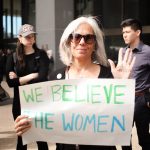Local leaders in women’s health policy and advocacy discussed the state of women’s reproductive rights in Massachusetts, in lew of the pending confirmation of Supreme Court Justice nominee Brett Kavanaugh, at the Edward M. Kennedy Institute for the United States Senate Tuesday night.
The discussion centered around potential cuts to women’s healthcare services and reproductive rights if Roe v. Wade was to be repealed.
Panelists included Massachusetts Secretary of Health and Human Services Marylou Sudders, Boston Public Health Commission Executive Director Monica Valdes Lupi, and President and CEO of the Planned Parenthood League of Massachusetts Jennifer Childs-Roshak.
The panel was hosted in partnership with WBUR and was moderated by Carey Goldberg, a health and science reporter for WBUR.
Goldberg began the discussion by asking how the loss of Roe v. Wade abortion protections would affect Massachusetts if it were to be overturned. To answer this, Sudders said she was confident Massachusetts would be able to overcome the loss of federal protections of women’s health services.
“Massachusetts has strong laws [and] has strengthened in the past year … to ensure women’s rights and access to the full range of reproductive rights and services available,” Sudders said in the discussion.
Childs-Roshak said she thought Massachusetts would not stand for restrictions to women’s healthcare.
“I think in Massachusetts, we will continue to push back and fight back,” Childs-Roshak said in the discussion, “and making sure that access to healthcare, access to sexual reproductive healthcare in particular remains as successful as it is in Massachusetts.”
Several attendees, such as Chris Mirabella, 20, said they disagreed with those who desire to dismantle access to women’s healthcare services.
“I think it’s fundamentally unjust that healthcare for women has come under attack the way that it has,” Mirabella, a Marblehead resident, said. “I don’t think that we would be having this conversation if men were the ones who needed abortions.”
Nurse and Dorchester resident Lisa Heelan-Fancher, 59, said she attended the discussion because she has been a supporter women’s rights for decades.
“I’m a nurse, I’m a woman and my area of research is involved in improving maternal outcomes, childbirth outcomes and that’s why I care about women’s health,” Heelan-Fancher said. “I’ve always cared about women’s health.”
Heelan-Fancher said she does not support Kavanaugh if he does not support women.
“I’m not really so sure he respects women because he might not recollect or recall that he assaulted women when he was drunk,” Heelan-Fancher said, “but he’s not even bearing any possible responsibility for his actions.”
Goldberg asked in the discussion if overturning Roe v. Wade would make women turn to abortion pills as an alternative. Dr. Childs-Roshak said this is a possibility, but not a solution.
“There are laws that will put a physician in jail if they perform an abortion or prescribe a pill that results in a abortion,” Childs-Roshak said. “It would be nice to think that that would be an easy solution … but that will essentially be a black market and will put people at legal risk, so I don’t think anyone’s thinking that that’s actually a great solution.”
Although Massachusetts could continue protecting women’s health services, the panelists discussed that low-income women and women of color still face obstacles to receiving treatment.
“Even in Massachusetts … we are going to see a widening of health disparity around low-income women,” Sudders said in the discussion.
Childs-Roshak also explained that although Massachusetts has laws securing access to services, other states in America provide a glimpse at what the loss of Roe v. Wade productions could look like.
“There has been a precursor in Texas … either, you know, back alley abortions or self-induced abortions,” Childs-Roshak said. “We know what happens when access is taken away, and so that very stark picture of Handmaid’s tale is very real.”
All panelists were directly involved with women’s healthcare, which Connor Holmes, 19, of Bourne, said he appreciated.
“They’re not the popular stakeholders you see in the media but, rather, these are women who are working very much on the front lines,” Holmes said.



